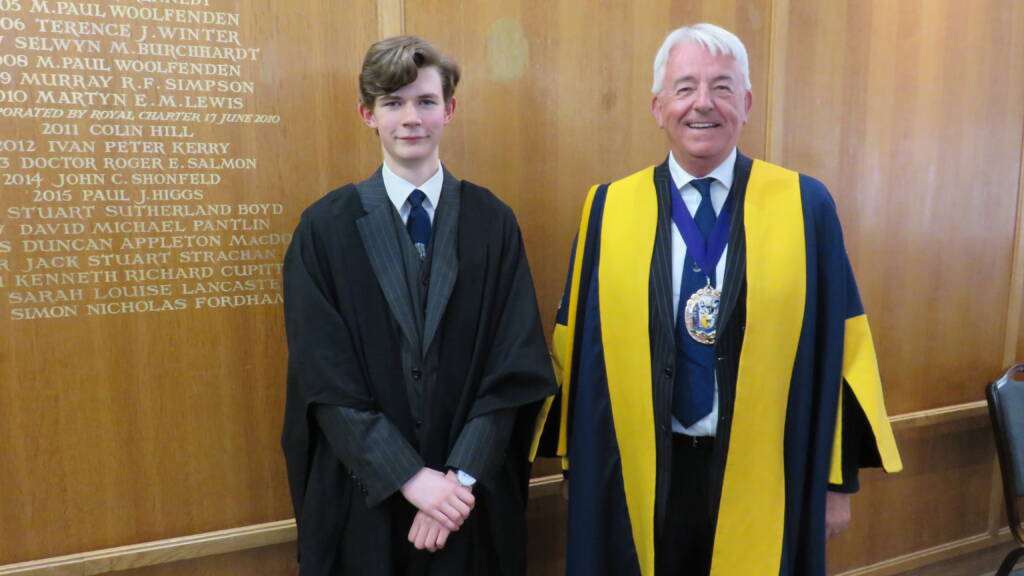One of the benefits of being Master is that you have the privilege to choose a charity for your year of office which in my case is Dementia and Alzheimer’s, in particular Admiral Nurses, like Macmillan Nurses but who specialise in dementia care patients and their families.
During February the Worshipful Company of Educators invited me to Anglia Ruskin University for their Master’s Lecture, where the immediate Past Master of the Musicians Company, John Nichols, gave a lecture on “Music In Dementia”. Music has been seen to have the unique power of unlocking the mind of those living with dementia and, in so doing, providing a means of communicating when other ways were not possible. This is the link to the video that John showed to the attendees https://www.youtube.com/watch?v=8HLEr-zP3fc
John Nichols, although not a musician himself, is involved in this remarkable and valuable application of music therapy, and in 2019 initiated a programme of Music in Dementia Hubs which not only gave the gift of music to those with dementia, but also provided them with a lifeline during the COVID-19 pandemic. Another link that he shared was by way of making up a playlist for the dementia sufferer and he suggested contact be made with https://www.playlistforlife.org.uk/
In the lecture John shared his experiences and explained the background to the initiative and its future potential; he stated that up to 12% of all deaths are because of dementia. The likelihood of developing dementia increases significantly with age with one in 14 people aged over 65 suffering from dementia. This rises to 1 in 6 for people aged over 80 although Dementia can affect younger people too and this is referred to as “young onset dementia” and around 1 in 20 people with dementia are younger than 65. There are more than 42,000 people in the UK under 65 with dementia and, statistically, Dementia is also more common among women than men.
The actual music sessions worked best when the patient was wearing headphones, which then blocked out other noise from causing a distraction with the choice of music something memorable from the past life of the dementia sufferer, therefore, it was better if a family member put together a play list of their favourites. Schubert, Mozart, Handel and Bizet were favoured for the classical and Vera Lynn, Bing Crosby and Frank Sinatra amongst the singers and songs they performed with musicals a particular favourite. The major benefits of this music-based approach is that it brought back the old more recognised personality and quietened those that had become aggressive due to tiredness or confusion. This recovery can last up to 40 minutes.
You may recall that it was in February that restrictions and precautions over Covid 19 were lifted and later in the month we seem to have abandoned most. Even in other countries they seem to have followed suit to try to return to some normal life. In my busy life, however, it was the second week of the month before face-to-face meetings recommenced as I only had one internet Zoom meeting to attend at that time. On Monday the 7th of February we had our Court meeting and lunch at the Hall at which time it was good to meet up and exchange experiences with fellow Livery men after the long period of reduced travel. Later that week I had another internet ZOOM meeting and on the Tuesday, 15th I was invited to join the Glaziers, jointly with the Nurses Livery, co-hosting their webinar when Glass artist, Sophie Hacker talked about the window she created to mark the bicentenary of Florence Nightingale’s birth in 1820.
This is a new stained-glass window, named “the calling window”, she created, and it was installed at Romsey Abbey in Hampshire in summer 2021, and shows the moment when, aged 16, Florence Nightingale said she was called by God. Sophie talked about the idea and the creative process she used when making it, and about Florence Nightingale herself. Florence Nightingale is regarded as the founder of modern nursing after coming to prominence during the Crimean War when she became known as “the lady with the lamp”. The window, funded by donations, in St George’s Chapel shows her seated on a stone bench in the grounds of Embley Park, her family home.
The event was hosted by the Upper Warden of the Worshipful Company of Glaziers, David Stringer-Lamarre and he was joined by the Master Glazier, Phil Fortey, and the Master of the Company of Nurses, Frances Davies. Interestingly the Nurses have adopted a novel way at official dinners of keeping up the Loving Cup tradition but instead of a drinking cup they exchange a lighted lamp but use the same technique of three standing. Similarly, the Glaziers, due to Covid, have modified the Loving cup tradition by placing chocolates in the drinking cup for the recipient to take one before passing it on. Ideas to think about adopting.






